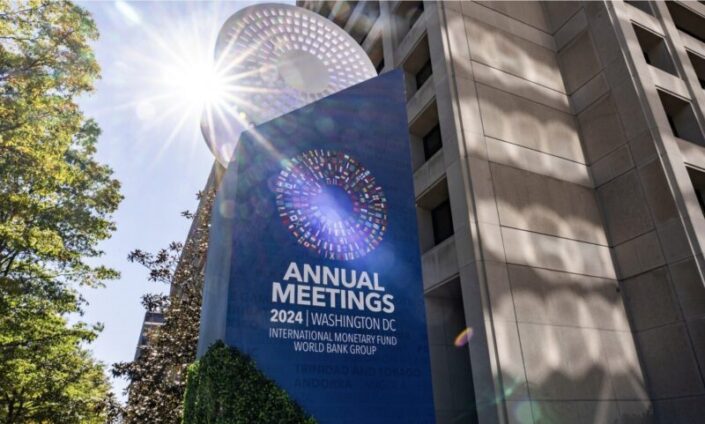The International Monetary Fund (IMF) says the world has almost won the battle against inflation, which reached its highest rate of 9.4 per cent in the third quarter of 2022.
“The battle against inflation is almost won; after peaking at 9.4 per cent year-on-year in the third quarter of 2022, we now project global headline inflation will fall to 3.5 per cent by the end of next year.”
Those were the words of Pierre-Olivier Gourinchas, IMF Chief Economist, who also noted that most countries were seeing their inflation rate within Central Banks’ targets.
The projected 3.5 per cent fall in inflation for 2025 is lower, compared with the 5.8 per cent that the Fund is predicting for 2024.
Mr Gourinchas said this at the release of the World Economic Outlook on Tuesday, October 22, in Washington, DC (USA), at the 2024 IMF/World Bank Group (WBG) Annual Meetings in Washington, DC (USA).
He attributed the slowdown in inflation without a significant recession to the resilience of the global economy, as growth was projected to be steady at 3.2 per cent for both 2024 and 2025,
The decline in inflation without a major recession is a major achievement. Much of the disinflation can be attributed to the unwinding of the unique combination of supply and demand shocks
Other contributing factors were improvements in labour supply, driven by immigration in many advanced countries, he said, adding that, “monetary policy played a decisive role in keeping inflation expectations.”
However, the IMF Chief Economist cautioned that risk remained going forward because of escalation in regional conflicts, which he said could be a serious setback to the commodity markets.
Again, undesirable trade and industrial policy shifts could also lower economic output, he said, noting that such risks could force tightening of global financial conditions, derailing the gains made.
“To mitigate these downside risks and to strengthen growth, policymakers now need to shift gears and implement a policy-triple-pivot,” Mr Gourinchas recommended.
The policy-triple-pivot included a careful easing of monetary policy rate, stabilisation of debt dynamics through fiscal policy and building buffers, and growth enhancing reforms.
He called for increased efforts in building trust between governments and citizens as well as corporate conversations, while further improving international collaborations to sustain the momentum on inflation easing and economic growth.
Latest Stories
-
EPA says lead-based paints are dangerous to health, calls for safer alternatives
15 minutes -
Queenmother calls on President-elect Mahama to appoint more women in his government
2 hours -
Atletico Madrid beat Barcelona to go top of La Liga
3 hours -
Usyk breaks Fury’s heart with points win in rematch
3 hours -
Ghana-Russia Centre to run Russian language courses in Ghana
8 hours -
The Hidden Costs of Hunger: How food insecurity undermines mental and physical health in the U.S.
9 hours -
18plus4NDC marks 3rd anniversary with victory celebration in Accra
11 hours -
CREMA workshop highlights collaborative efforts to sustain Akata Lagoon
11 hours -
2024/25 Ghana League: Heart of Lions remain top with win over Basake Holy Stars
13 hours -
Black Queens: Nora Hauptle shares cryptic WAFCON preparation message amid future uncertainty
13 hours -
Re-declaration of parliamentary results affront to our democracy – Joyce Bawah
13 hours -
GPL 2024/25: Vision FC score late to deny Young Apostles third home win
13 hours -
Enhancing community initiatives for coastal resilience: Insights from Keta Lagoon Complex Ramsar Site Workshop
13 hours -
Family Health University College earns a Presidential Charter
14 hours -
GPL 2024/25: Bibiani GoldStars beat Nsoatreman to keep title race alive
14 hours

